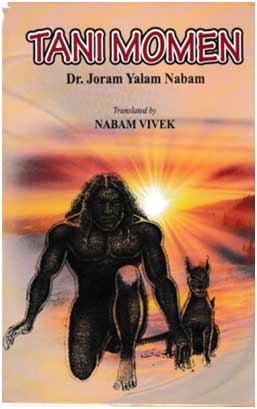Tani Momen
by Dr.Joram Yalam Nabam
Translated from Hindi
by Nabam Vivek
Pages: 143
Price: 495
[Yater Nyokir]
The myth of Abo Tani is a key source to justify and validate the breathing social system, and an account of the traditional rites and customs of the Tani race of Arunachal Pradesh. It remains an area to explore to seek answers to mind-boggling questions, such as, who created the world? Who was the first man on Earth? How did the celebration of festivals begin? And so on.
The narration of the myth of Abo Tani is a part of the rituals during festivals, marriages, births, deaths and housewarming occasions among the tribes under the Tani phylum of Arunachal. However, there is no authentic record that holds the myth of Abo Tani. Instead, it is a part of oral tradition, because of which there is a slight deviation in the various versions of the stories, according to the regions.
Substances from the myth of Abo Tani are often used and elaborated by many Arunachalee writers.
Tani Momen is a coherent narrative of the myth of Abo Tani for contemporary readers. It is a first-of-its-kind voluminous work on the myth of Abo Tani, comprising 44 chapters. The book is originally written in Hindi by Dr Joram Yalam Nabam, a distinguished professor of Hindi. Nabam Vivek has offered a fine translation in English.
As the title reflects, the book unfolds various adventures of Abo Tani and how his inner strength outshines all challenges. It begins with the story of the universe’s journey from the great nothingness, Jimi-Jama, to being, and sheds light on the pantheons said to have sojourned in the land of Abo Tani. It has unsaturated tales of the wedlock of Abo Tani with various goddesses and his continuous clashes with characters that represent evil – treachery, betrayal and deceit.
While telling about the romance of Abo Tani, the author also unveils the truth behind rituals and customs, and lets us learn morality and our responsibilities towards the land, our family and friends. This shows the extensive amount of research she did, and her voracious passion for mythology.
Today, everywhere in the world, the wall of ignorance is soaring high, and people are turning away from the narratives that speak of shared destinies. Myth is a vital part of culture. It guards our culture and tradition; its importance cannot be overlooked as the society derives its ideologies from myths. It is said that from their perch, they ruled every aspect of human life.
Tani Momen is an interesting take on the myth of Abo Tani. The only major qualm with the book is its sloppy editing – typographical errors, incorrect punctuations and spelling errors which affect the cadence of the narration. Yet the book is enlivened with vibrant stories, and facilitates learning about mythology. The author and translator deserve applauds for carrying out the humongous task of presenting the arcane tales of Abo Tani to the readers. (The reviewer is from the Department of Education, Rajiv Gandhi University, Rono Hills)



